Hiring new employees can be a very time consuming and expensive process. Consequently, employee retention should always be top of mind. It’s far more effective to retain your top talent instead of having to replace them. Particularly if their departure is unexpected and you have to try to fill the void immediately without proper planning. The best way to retain staff, reduce turnover and spend less time and money in the future is to hire effectively in the first place. I’ve put together six essential questions that I always ask myself when making a new hire decision. Don’t take these as gospel. Think about how these questions might apply to a candidate to your company, or in your industry. Introspective questioning is an excellent method to analyse the candidate and assess criteria, instead of simply ticking boxes. Let’s get right into it!
Can they do the job?
While all jobs are different, each role has a minimum requirement that must be met. Start by assessing the candidate’s ability to perform the needs of the position. Ideally, this would have been screened by the recruiting team before the interview. It’s essential to go into more depth during the in-person or video conversation – after all, a resume is just words on the screen!
One way would be to request the candidate to complete a task or work on a sample project. This allows them to showcase their skillset under real conditions and will enable you to analyse how well they performed. Candidates who excel, especially when unprepared, are likely to achieve better under pressure and be better suited to the role. This criterion is an example of something you could assess. Think about how this applies to your business and the positions you might be hiring for.
Will they do the job?
Just because a candidate is qualified and capable of doing a job, this doesn’t necessarily mean they will. An excellent tactic to assess this is by questioning their commitment to the role. In a way that encourages an open and authentic answer. How do we do that?
“What aspects of the role do you think you’ll like? And which will you dislike?”
It’s a little bit of rough question for the candidate, but it will help both of you understand how much they will enjoy the role (or not). Ideally, they’ll be looking forward to the parts of the role they’ll often be doing, and maybe dislike the tasks that they only have to do rarely. The best candidate will probably be the one that relates positively to everything the role involves. This is especially likely if they are most passionate about the tasks that they’ll regularly be doing.
Consider their response and ask yourself how committed they sound to the role and their application. You want a new hire who is keen and committed for the long haul!
Will they fit the team?
This can be a hard question to answer. Lots of personalities and workstyles have a place in a well developed, diverse and high functioning team. A right approach may be to assess how well they perform in a group and how effectively they can add value in collaboration with others. You may ask the candidate for specific examples of how they’ve been able to do this as well as the type of work environment and styles they prefer.
If you can, facilitate a group interview or team immersion to get a first-hand feel of how they get along with the existing employees they’ll potentially be working it.
How do they differentiate themselves?
The chances are that lots of applicants have the same skills and qualifications required for the role. It’s always worth digging to find what makes a specific candidate different as this could be the difference between hiring a great employee or an average employee.
What have they achieved that others haven’t?
Do they do anything extraordinary outside of work?
Have they gone above and beyond in their previous roles? How?
The types of candidates that can answer these questions are likely those that will differentiate your business from your competitors. Maybe they have that secret sauce you’ve been looking for!
Are they committed to continual improvement?
The economy, technology and work environments are changing more rapidly than ever before. Your employees need to keep up. Realistically, you may not even be hiring for a specific role, as the requirements of the position change over time. As the company grows, your employees need to grow too. When experienced staff inevitably move on, it’s best to have an internal replacement, nuanced in your company culture, if possible.
Hire people who are committed to continuous improvement. Anyone else may hold your business back in the long run.
Can they help develop other leaders?
You might be interviewing entry-level candidates at the moment. But consider, who are the future leaders of the business? Wouldn’t it be great to build talent from the ground up? Not everyone sets their sights on leading at all times. However, everyone can lead in an area of expertise or a particular project or initiative. Not only should this be a desirable trait, but their ability to inspire and bring the best out of other employees is a potentially invaluable skill to bring to the table. Ask yourself where you see them sitting in ten years – hopefully, it’s near the top!
What do you think?
Are there any more questions you ask yourself?
Has there been a tough question that’s saved your company from a bad employee experience?
Have you given the right person a chance and they smashed it?
How was your new hire experience?
Until next time,
Anwar Khalil





Blog comments